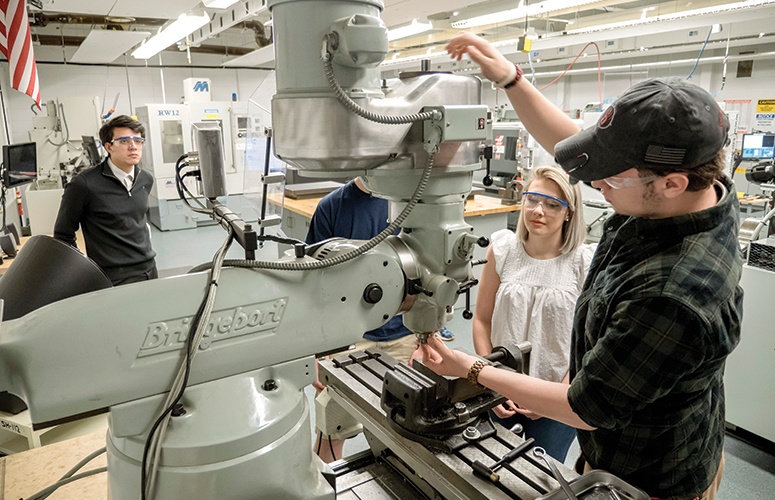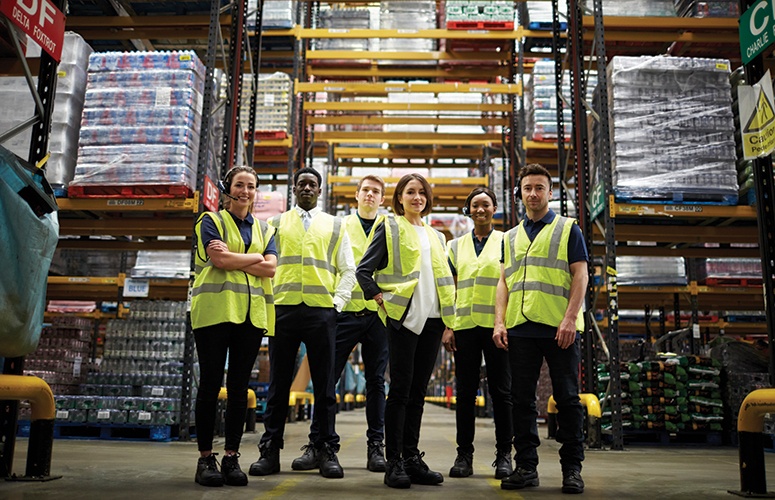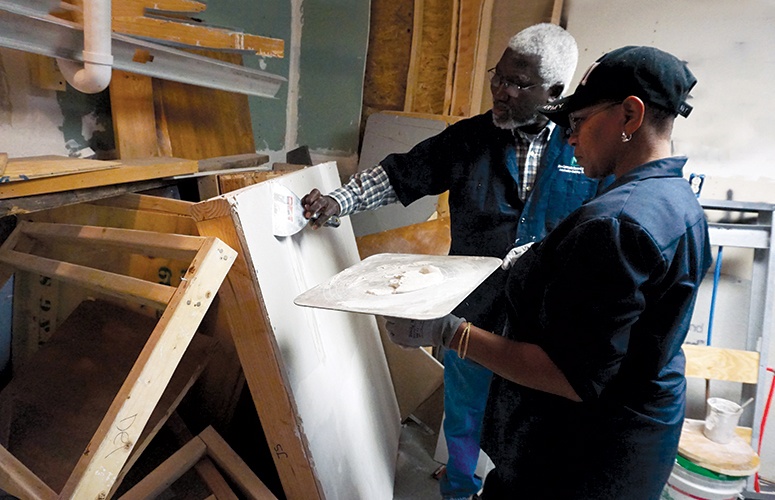
Educating a Workforce for Advanced Manufacturing
Community colleges and county vo-tech schools are expanding to address New Jersey manufacturers’ growing demand for high-tech savvy labor.
By Joe Cavaluzzi, Contributing Writer On Oct 4, 2018Vocational-technical high schools and community colleges are teaming with companies throughout New Jersey to educate the future manufacturing workforce and provide training in cutting-edge technologies for current workers. Educators say their efforts are producing graduates who are prepared to enter a manufacturing sector increasingly reliant on advanced manufacturing, which uses innovative technology to improve products or processes and usually requires fewer – but higher-skilled and higher-paid workers than – traditional manufacturing.
Generally, advanced manufacturing is defined as manufacturing that includes automation, sensing and other digital technologies to increase efficiency and precision. Eighty-two percent of manufacturing GDP in New Jersey comes from advanced manufacturing industries, which includes food preparation and packaging, chemicals and pharmaceuticals, machinery, fabricated metal, and computers and electronics, according to the New Jersey Manufacturing Extension Program (NJMEP).
The educational initiatives underway are helping overcome the misconception that manufacturing provides lower-level jobs with limited futures. The advanced manufacturing model provides highly technical, good-paying jobs that achieve greater precision and efficient, clean processes industries that have shed their smokestack image.
Waiting Lists at County Vo-Tech Schools
“There was a stigma about manufacturing. People didn’t understand that many of these jobs were really good jobs and very high-tech jobs,” NJ Council of Vocational and Technical Schools Executive Director Judy Savage notes. That image is changing, however, and the number of vo-tech schools with strong manufacturing technology programs has grown from one at Passaic Vo-Tech, which offered the first computer numerical control (CNC)-driven shop in the state in 2012, to vo-tech schools in 12 counties.
“In 2012, we started to bring the conversation to the state’s manufacturing industry, and developed relationships with the New Jersey Business & Industry Association (NJBIA) and NJMEP. That was at the time that New Jersey started to create its Talent Networks,” Savage says. “When we talk about secondary school students, it’s not about training people for one job, it’s about giving them the basis for working in manufacturing. Vo-tech schools are trying to emphasize the range of these programs.” Many vo-tech schools have started to teach mechatronics (technology combining electronics and mechanical engineering). “So, students are learning system thinking and how to put together mechanized projects.”
The initiative in which manufacturers shape programs that match skills in demand now and that will be in demand in the future appear to be paying off, because vocational schools are turning away more students than they can accept.
The Continuum of Manufacturing Education
The New Jersey Council of Community Colleges’ (NJCCC) Consortium on Workforce & Economic Development has worked for the past 8 to 10 years on tying programs to both vo-tech schools and manufacturers’ labor needs.
“The consortium probably has almost 100 manufacturing companies that we talk to and who let us know where things are going in their industry,” NJCCC President Aaron Fichtner says. “We’re focused on areas of high-tech manufacturing. We have a lot of mid-to-small manufacturers in New Jersey. There are a lot of defense contractors and metal fabrication companies (whose products) are critical to larger manufacturing enterprises. There also is some interest in programs around biotech. We’re a very diverse state, with a clean, technology-focused manufacturing environment.”
Addressing Growth of AI and Robotics
Community colleges are offering Associate in Applied Science degrees in engineering and advanced manufacturing that Fichtner says prepare students for skilled positions with manufacturing companies or allow them to go on to earn a Bachelor of Science in engineering. He cites Camden County College, which has garnered a $1-million federal grant to develop programs in advanced manufacturing. “Community colleges conduct a lot of work around expanding metal fabrication on the non-credit side. Camden has one such initiative,” he says. “While businesses are turning to artificial intelligence or robotics, there are not enough workers with those skill levels. That’s what we’re focused on – how to keep pace with job needs.” Part of that effort is customized training, where colleges design training for individual employers. There are also certificate courses from college continuing education departments for people already working. “That’s an important role for community colleges to play, to help people up-tool, and to up-skill workers throughout their careers,” Fichtner says.
The County College of Morris is a notable example of combining student, workforce and manufacturing company needs together through its Engineering Design and Advanced Manufacturing (EDAM) program. EDAM enables high school juniors and seniors to take classes in engineering, computer science, electronics and other technology applications while earning 32 college credits before high school graduation. Students also earn County College of Morris Certificates of Achievement in mechanical computer aided drafting and engineering technology. Partnerships with area manufacturing companies, the NJBIA, the Advanced Manufacturing Talent Network and NJMEP provide students with work-based learning experiences to give them an inside track to employment upon completing the program.
EDAM graduates also have the option of continuing at CCM to earn an Associate Degree in Mechanical Engineering Technology in just one year, and then transfer to New Jersey Institute of Technology (NJIT) to earn a bachelor’s degree in engineering technology or a related field.
A New Home for Advanced Manufacturing Students
CCM’s EDAM program has become so much in demand that the college is breaking ground this fall on new 30,000-square-foot Advanced Engineering and Manufacturing Building.
“Over time, advanced manufacturing has become a very hot field. It pays well. We were not able to keep up with the demand from students or the demand from area manufacturers. We were maxed out, our wait lists were expanding, and we had manufacturers donating equipment, but had no place to put it,” CCM President Dr. Anthony J. Iacono says.
The Morris County Economic Development Authority notes that more than 1,250 manufacturers in 150 industries are producing $1.3 billion worth of products a year in Morris County. They employ about 7,900 people and account for more approximately 11 percent of the state’s 11,000 manufacturers.
“We went out and met with manufacturers and asked, ‘If we were to expand our facilities, what would that look like?’” Iacono explains. “After a year of conversation, we decided we had to secure funding to build our own facility.” The $10-million Advanced Engineering and Manufacturing Building, funded in part with voter-approved County College Capital Projects Fund Act money, will focus on engineering and manufacturing and will have a welding lab as well as robotics. Iacono says the new building will open in the fall of 2019 or spring of 2020.
CCM also will offer customized training for companies in its new facility.
“The big piece of that is establishing a general apprenticeship program and then customizing it for specific manufacturers,” Iacono says. “We listen to industry professionals about what individuals need to learn so they are ready upon graduation to go to work right away.”
Most of CCM’s engineering students who choose to continue their education move on to NJIT or Rutgers University, which Iacono says works with CCM “because they want students who are well prepared.”
New Look of Engineering Labs
NJIT offers degree programs in engineering that include biomedical, civil, chemical, electrical, industrial and mechanical, according to Sam Lieber, program coordinator for NJIT’s Manufacturing Engineering Technology Program. The Engineering Technology department has a program geared toward students interested in careers as process and manufacturing engineers. “This includes a strong foundation in manufacturing and inspection processes, quality systems, computer aided design and manufacturing (CAD/CAM), and automation. The Industrial Engineering program is geared toward students who will work in manufacturing with a strong emphasis on supply chain management, lean manufacturing, and industrial statistics.
Students also take advantage of the NJIT Makerspace, a state-of-the-art advanced manufacturing facility that opened last year and includes an array of 3D printing options, including a metal additive manufacturing unit. Manual machines, laser cutters, and assorted high-tech tools are available for prototyping and exploring fabrication options. The Makerspace includes advanced options for fabricating including CNC equipment. NJIT also has invested in automation training with a modern robotics and automated controls lab.
State Legislature a Critical Component
Lieber notes that the US Department of Labor has announced $150 million in grants to expand apprenticeships in key industry sectors. “Governor Murphy has included $10 million in the FY 2019 budget to create the NJ Apprenticeship Network (NJAN),” Lieber says. “This initiative will spur economic development and create new career and educational opportunities.”
As more of the state’s manufacturers move into advanced manufacturing, and vo-tech schools and higher education institutions address growing demand for skilled workers, NJ Council of Vocational and Technical Schools’ Savage notes that the State Legislature has joined the conversation with the formation of the bipartisan New Jersey Legislative Manufacturing Caucus last year. “From the outset, there was a huge emphasis (by the caucus) on workforce development,” Savage says. One of the caucus’ first recommendations was to put a question on the ballot next month to fund expansion of county vocational schools and county colleges for technologies in areas where jobs are in demand. After a conditional veto that cut funding in half, Gov. Murphy signed legislation in late August allowing the question to be placed on the November ballot. Voters will have the opportunity to decide if $500 million in bonds will be issued, approximately $350 million of which will be used for vo-tech and county college expansions and school security measures.
“NJ vocational schools are turning away more students than they can accept. The ballot question makes technically skilled jobs a high priority and manufacturing will be a priority among them,” Savage notes.
Related Articles:






